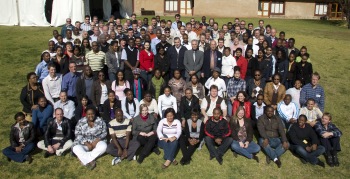Today saw the closing ceremony in Daejeon, Korea, for the twelfth in the series of World Nuclear University (WNU) training courses for nuclear professionals, entitled 'Key Issues in the World Nuclear Industry Today'.
This was the second occasion that the course has been held in Korea, with 55 participants receiving their course certificates at the Nuclear Training and Education Centre of the Korea Atomic Energy Research Institute (Kaeri), who were the hosts.
During the previous week, the same course ran for the third time at Tsinghua University in Beijing, China, with a record attendance of 260 people associated with the booming Chinese nuclear sector. The course in Beijing this year was co-hosted by the Chinese Nuclear Energy Association (CNEA), a relatively new body formed to represent the interests of over 200 nuclear companies there.
With the completion of these two courses in Asia, no fewer than 1685 participants have so far experienced this training over the past two years, in Argentina, Brazil, South Africa and Turkey as well as China and Korea.
 |
| The students and leaders of the South African course |
The teachers for these WNU courses are drawn from a small number of experts, collectively capable of passing on first-hand knowledge of a broad range of subjects relevant to the future of the nuclear industry. These range from world energy issues and prospects, through nuclear fuel, economics and financing, non-proliferation, radiological protection and waste management, to the public acceptance of nuclear. This core team of teachers has been backed by staff seconded by the International Energy Agency (IEA), the Nuclear Energy Agency of the OECD (NEA) and the International Atomic Energy Agency (IAEA). In addition, the key nuclear plant vendors have presented their latest product offerings at the courses, while local nuclear experts have added their own perspectives.
The courses are targeted at interested countries with the aim of broadening the knowledge and experience of their specialist nuclear professionals. These have been drawn from three discrete groups, namely local universities and research institutes, the industry itself and finally governmental people concerned with nuclear. A related aim has been to encourage networking amongst these disparate groups within countries, who do not usually interact with each other as often as they would like.
It is the WNU's intention to expand the country coverage of these courses, as both financial and teaching resources allow. South East Asia (probably to be held in Singapore) is a top priority, while other venues are being actively explored.




_18570.jpg)
_16159.jpg)
_49205.jpg)
_18938.jpg)





